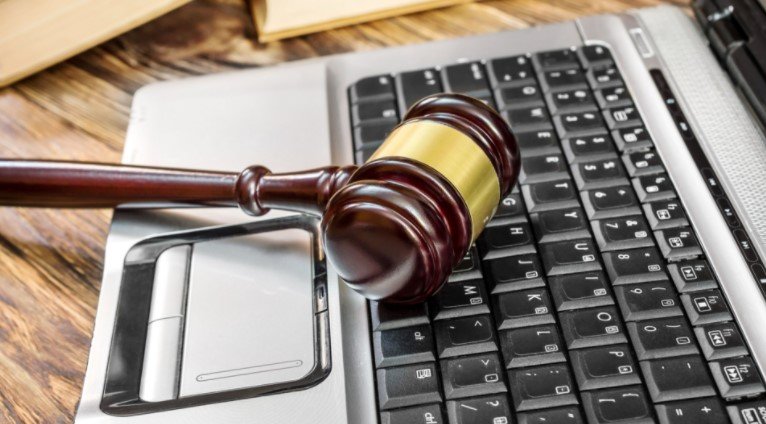The use of a laptop is not limited to an individual, firm, or establishment. People work remotely from the comfort of their homes to earn a living. Professionals such as doctors, lawyers, engineers, teachers or professors, and other white-collar jobs can use laptops. But, can a lawyer use laptop in court?
A lawyer can use a laptop in court premises but is legally bound against taking the laptop into the courtroom. This article discusses the possibility of using a laptop in the courtroom and why lawyers need laptops in their profession.
Can A Lawyer Use Laptop In Court?
Many people often ask this question, can a lawyer use laptop in court? Most lawyers prefer to document files on their laptops for storage purposes. However, the privilege of accessing those documents stored in the laptop is limited. Usually, lawyers must provide original documents of the cases they are about to defend. But most times, some information when digitalized might be wrong. Photoshops are very easy to come up with, and this is why many Judges don’t allow lawyers to present digitalized documents.

Another reason lawyers can’t use laptops in court is the inconvenience of exchanging documents with opposing counsel. For example, we often see lawyers present paper documents related to the case to the judge or the opposing counsel. If such documents are on the laptop, there’s no way to share them easily.
Another reason is the difficulty in annotating electronic documents. Also, a lawyer cannot scribble notes on an electronic document as they do on paper. Moreover, court clerks usually rubber-stamp a document that lawyers file. If these documents are electronic, stamping won’t be easy at all.
One other hindering force behind the refusal of a laptop or any digital device is an attempt for lawyers to go confidential. Clients’ documents are meant to be kept safe and only carried around when necessary. Having these documents in any digital device places those documents at risk of exposure.
So, the only laptop that we can even see sometimes is the laptop for court reporters using zoom since they are usually authorized to enter the courtroom with their devices.
Benefits Of Using Laptops For Lawyers
Most lawyers use the laptop to get their works done and to access clients’ files. From far or near, lawyers must always communicate with their clients over vital issues. Additionally, lawyers always want to keep themselves updated with current issues. These are information they work with to get knowledge on the rights of the clients they will defend.

Just as most websites are created for businesses and other social reasons, some websites create opportunities for people to meet with a lawyer for a consultation. Lawyers also seek customers to patronize their profession, so they log into those websites.
Some benefits lawyers derive from the use of laptops are:
1. It Enables Quick Recovery Of Case Items
Traditionally keeping vital information about a case comes in paper form. However, lawyers handle cases that last for months and even years. Most times, those cases come up after years of break and will require the retrieval of past documents.
These paper contents, contacts, appointments, and due dates related to the case will be sorted, which is quite frustrating. However, the laptop helps manage and recover those documents if they are stored digitally.
2. Keeps Your Working Place Tidy
It takes extra effort for lawyers to have a desk free of papers. A typical lawyer will always have papers flying around on his desk, let alone around the corners of the office. The sights of all these papers might not be impressive, but then what do you do?
One importance of a laptop is the ability to contain a lot of information for storage and retrieval. With your laptop, you can quickly reduce the number of papers lying around the office.
3. Provides Appropriate Means Of Taking Notes Of Details
Some lawyers take notes of important points on their phones when discussing with clients. But most persons discredit anyone who presses the phone during a conversation. It might seem not nice to them as they feel you’re not taking them seriously.
That’s why a laptop will present a more formal view of note-taking to the client. It will enable a lawyer to document some points without appearing rude in the process.
4. It fosters work flexibility.
The idea of working with a laptop enhances work flexibility for lawyers and still keeps them connected to clients. With a laptop, you can be away from your office and still perform your duties. This does not include your duties in the courtroom. Cases will not defend themselves.
But, if your firm sends you on official duty, you can still connect with your clients via the internet. Also, you can share ideas, work with your teammates through zoom meetings or other meeting apps using your laptop.
5. It Has Considerable Vast Storage Capacity
Some phones come with considerable storage space. Yet, the storage space of phones and tablets cannot be compared to that of a laptop. A laptop can store as many documents as a lawyer will want to save.
So, with your laptop, you can save many case files for many years and easily retrieve them whenever the need arises. But, most importantly, you can store the files on Cloud and download them safely anytime.
6. Ability To Multi-Task With Speed
Multi-tasking with your phone is possible quite alright. But you will have to close apps to open another app, and that does not improve speed. However, this is not the case with a laptop. A laptop will allow you to have those apps opened in a split format.
Conclusion
This article answers the question, can a lawyer use laptop in court. A lawyer is not authorized to use devices like smartphones, iPad, iPods, cell phones, audio and visual recorders. However, they can use these digital devices, including his laptop computer outside the courtroom, to facilitate work efficiency.
However, these devices are not that efficient in the courtroom. This is because paper documents are easy to share, process, and even stamp. Moreover, most judges might doubt the authenticity of an electronic file. Therefore, this article also shows the clear benefits of using these devices outside the courtroom.